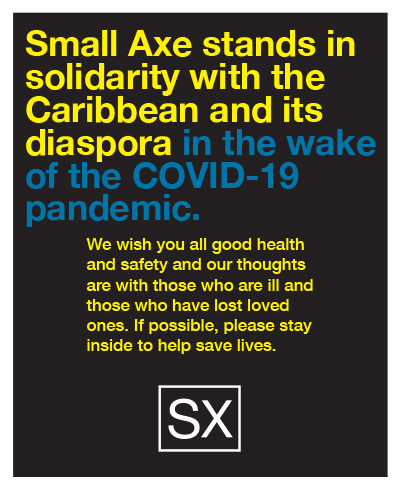sx blog
Our digital space for brief commentary and reflection on cultural, political, and intellectual events. We feature supplementary materials that enhance the content of our multiple platforms.
Resolutely Black: A Book Discussion with the International Consortium of Critical Theory Programs
Resolutely Black: A Book Discussion with the International Consortium of Critical Theory Programs

Date: Thursday, June 18
Time: 10:00 am PDT / 7:00 pm CET
Resolutely Black, a conversation with Françoise Vergès (Independent Scholar, Paris), Matthew Smith (Northern Illinois University), and Donna Jones (UC Berkeley), moderated by Karl Britto (UC Berkeley).
Join the International Consortium of Critical Theory Programs on Zoom for an inaugural event in a series of interventions organized by the Critical South book series. These events will put recently published books on Blackness and decoloniality into timely conversation with our current political moment.
Resolutely Black takes the form of a series of interviews with Aimé Césaire that were conducted by Françoise Vergès shortly before his death. Their conversations take up questions around the origins of Césaire’s political activism, the legacies of slavery and colonialism, reparations, and tensions between literature and politics. Who should be considered a citizen of a nation? Should a state recognize slavery as a crime against humanity? What role did the colonies and their inhabitants play in the modernization of metropolitan centers? These conversations around race and coloniality are ones we must urgently return to in order to dismantle all forms of anti-Blackness.
Register here to receive a personalized Zoom link to join the webinar.
Small Axe stands with Black Lives Matter protestors
Small Axe stands with Black Lives Matter protestors
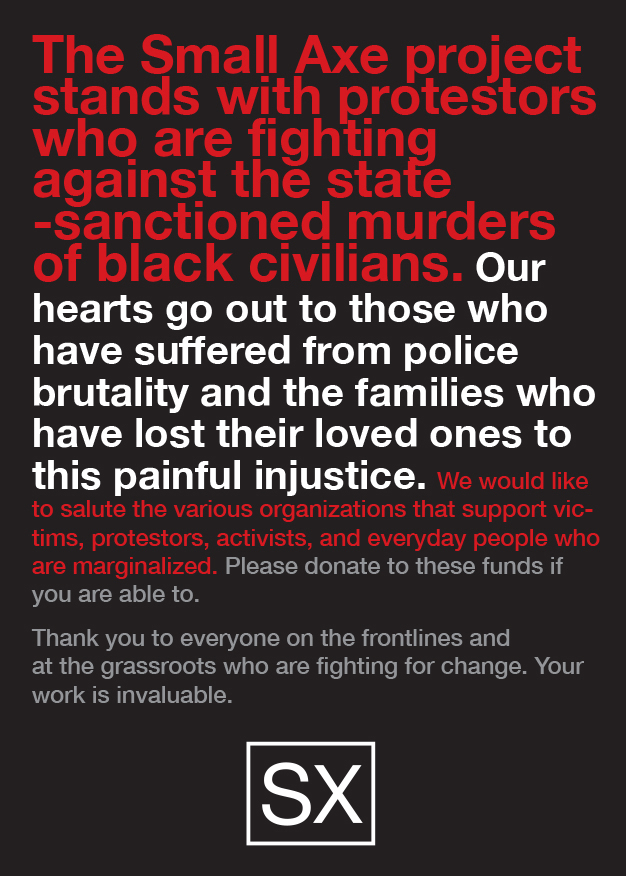
Activist Organizations:
Black Visions Collective: https://secure.everyaction.com/4omQDAR0oUiUagTu0EG-Ig2
Reclaim the Block: https://secure.everyaction.com/zae4prEeKESHBy0MKXTIcQ2
Assata’s Daughters: https://donorbox.org/nov-2016-push
Bail and Legal Defense Funds:
Split a donation: https://secure.actblue.com/donate/bail_funds_george_floyd
Bail Funds/Legal Help by City Masterlist: https://docs.google.com/document/u/0/d/1X4-YS3vFn5CLL9QtJSU0xqmTh_h8XilXgOqGAjZISBI/mobilebasic
NAACP Legal Defense Fund: https://org2.salsalabs.com/o/6857/p/salsa/donation/common/public/?donate_page_KEY=15780&_ga=2.246477828.1853192672.1591099079-706652317.1591099079
Columbus Freedom Fund: https://www.paypal.me/columbusfreedomfund
Richmond Community Bail Fund: https://rvabailfund.org/donate
NW Community Bail Fund (Seattle): https://donorbox.org/ncbf
Chicago Community Bond Fund: https://chicagobond.org/donate
Brooklyn Community Bail Fund: https://brooklynbailfund.org/
Messiah Young and Taniyah Pilgrim Support: https://www.gofundme.com/f/messiah-young-and-taniyah-pilgrim-bail-money
Protestor Bail Out: https://www.gofundme.com/f/protestor-bail-out?utm_source=customer&utm_medium=sms&utm_campaign=p_cf+share-flow-1
People’s City Council Freedom Fund (Los Angeles): https://www.gofundme.com/f/peoples-city-council-ticket-fund
Fundraisers for Victims of Police Brutality:
Black Lives Matter link to victim memorial funds: https://blacklivesmatters.carrd.co/#victims
Official website for Breonna Taylor: https://www.standwithbre.com/
https://transgenderlawcenter.org/donate
The Tony McDade Mental Health Recovery Fund: https://docs.google.com/forms/d/e/1FAIpQLScFbCqnPzsY0pSi39i_AjsTpVZpqJ20IOlJoX37N5qOHqN6cA/viewform
Mutual Aid Funds:
Nourish NYC: https://linktr.ee/NourishNYC
Richmond Mutual Aid Fund: https://www.paypal.me/richmondmutualaid
Louisville Mutual Aid: https://www.gofundme.com/f/louisville-mutual-aid-a-new-world-is-possible
NYC Mutual Aid: https://mutualaid.nyc/get-involved/donate/
Detroit Mutual Aid Spreadsheet: https://docs.google.com/spreadsheets/d/1-m6QBgqejlk2h6uJ0WGkphZuZ5MR3-uWCkv2vSZcHY8/edit?fbclid=IwAR3XuEWC4TLg8W9vQgBEfed0yA7ZWLBjk20XAjP_twGGd_3X5x0aThUEX4c#gid=1764810953
St. Louis Mutual Aid: https://donorbox.org/stl-mutual-aid-fund
Los Angeles COVID-19 Mutual Aid Network: https://www.gofundme.com/f/covid19-mutual-aid-network
Metro Atlanta Mutual Aid Fund: https://www.atlantamutualaid.org/checkout/donate?donatePageId=5e853482048a040a10998780
Mutual Aid Philadelphia: https://www.paypal.com/pools/c/8oNSd8W8KH
Minneapolis Public Housing Residents Mutual Aid Project: https://actionnetwork.org/fundraising/public-goods/
Appalachian Youth Network Mutual Aid Fund: https://secure.actblue.com/donate/mutualaid
Seattle COVID-19 Survival Fund: https://www.gofundme.com/f/covid19-survival-fund-for-the-people
Albuquerque Fight for Our Lives Mutual Aid: http://www.ffol.org/mutualaid.html
Salt Lake Valley COVID Mutual Aid: https://www.covid19mutualaidslc.com/
Cleveland Pandemic Response: https://cleveland.recovers.org/
East of the River Mutual Aid Fund (BLM DC): https://www.gofundme.com/f/blmcovid
Solidarity Support Distro Boston: https://fundrazr.com/f1dTp3?ref=ab_AWNe0zELiZHAWNe0zELiZH
Art Museum of the Americas presents WENDY NANAN, an #AMAatHome exhibition
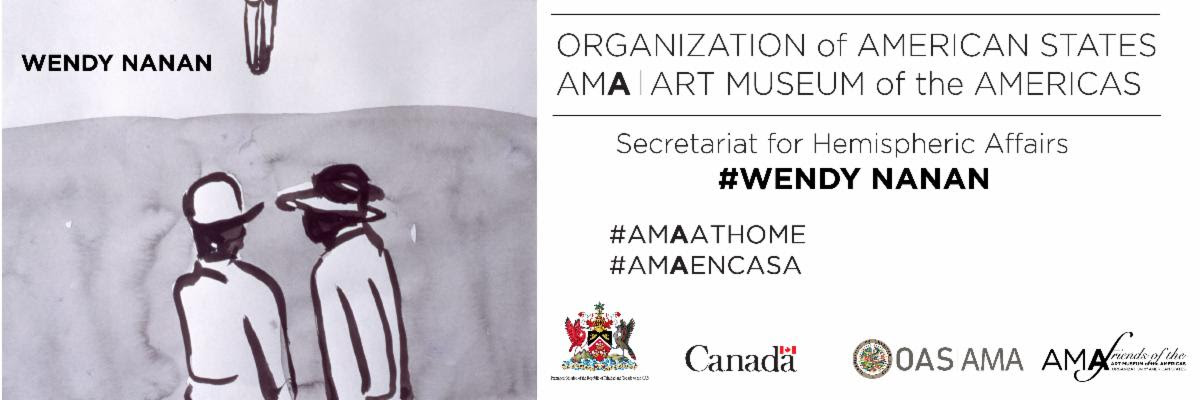
June 4th at 5:00pm
Live zoom performances by poets Andre Bagoo, Des Seebaran and Shivanee Ramlochan, and the participation of exhibition curator Andil Gosine
Watch the documentary “Wendy Nanan” by Andil Gosine
We invite you to visit WENDY NANAN, an #AMAatHome #AMAenCasa beginning May 28 on our four social media walls: Instagram, Facebook, Twitter, and YouTube. We will be sharing the exhibition over the course of seven days on all four walls. AMA’s new initiative features exhibitions specifically curated for its social media platforms.
The AMA | Art Museum of the Americas of the Organization of American States (OAS) and the Permanent Mission of Trinidad and Tobago to the OAS proudly present WENDY NANAN, a retrospective solo exhibition by the pioneering Trinidadian artist. Curated by Trinidadian-Canadian scholar and Small Axe editorial committee member Andil Gosine, WENDY NANAN will be the largest exhibition of the artist’s life’s work, and will include key projects from her repertoire over the last four decades.
InfiniteBody interviews sx salon's Rosamond S. King
InfiniteBody interviews sx salon's Rosamond S. King
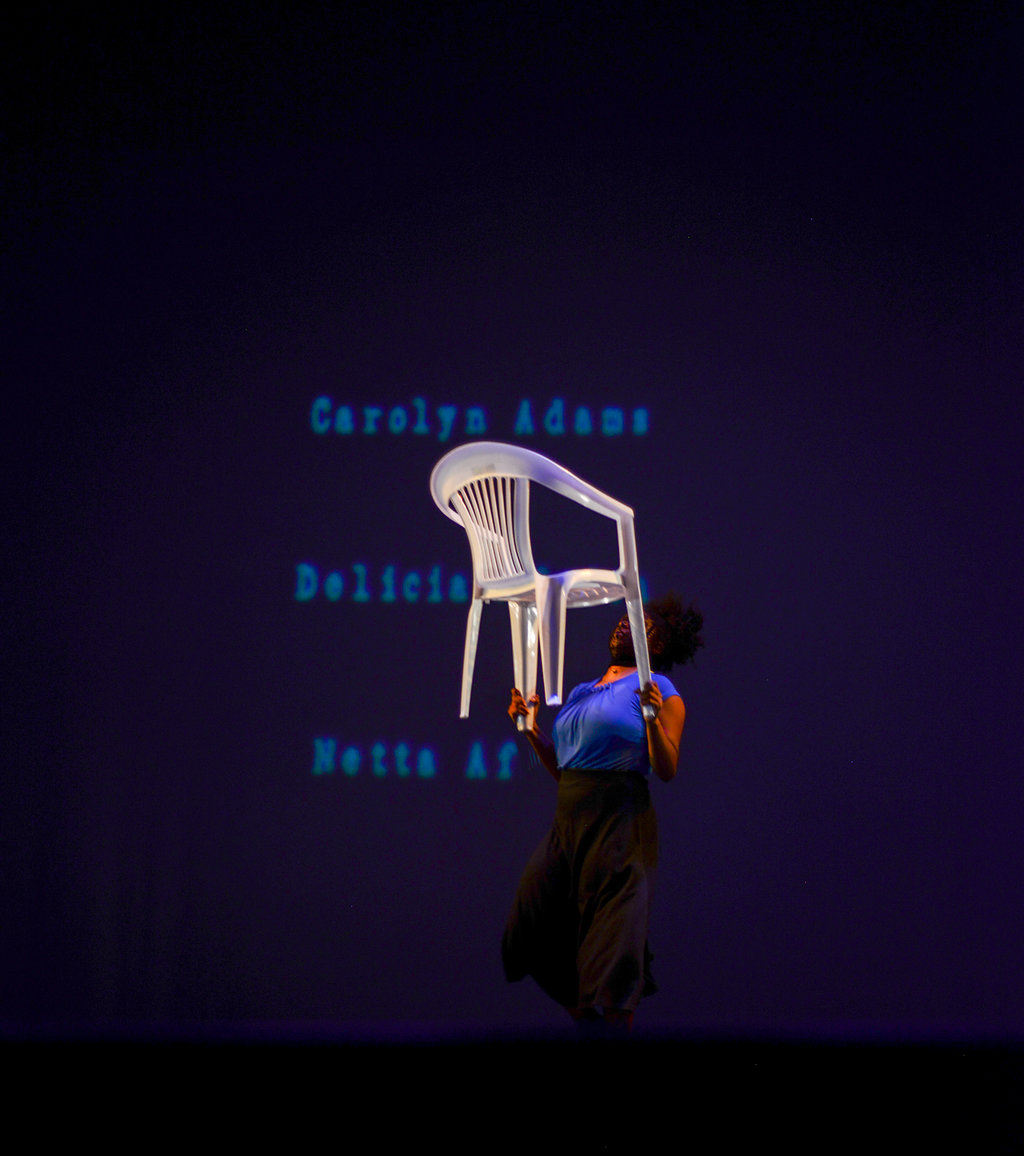
Writer, curator and community educator Eva Yaa Asantewaa recently had the pleasure of interviewing sx salon's creative editor, Rosamond S. King.
Read the interview about King's artistic process and journey as a writer/perfomer on Asantewaa's blog, InfiniteBody, here.
Photo: Brandi Rei Tucker in #SAYHERNAME by Rosamond S. King (photo: RestorationArts), from InfiniteBody
archipelagos journal issue (4) is now available!
archipelagos journal issue (4) is now available!

It has been something of a particular challenge to reach the finish line with this fourth issue of our journal, and this for two reasons—both of them, in the end, exhilarating. First, there is what feels like a momentous transition: hatched four years ago and graciously incubated in the luxurious intellectual nest that is the Small Axe Project, we now set off on our very first solo flight. From sx archipelagos we have evolved into the newly-named archipelagos journal—a critical space that is at once very much of its origins and original unto itself, both devoted to SXP’s foundational critical intentions and committed to forms of experimentation and networks of expansion that are unique to our digital Caribbean context. Second, we are making a joyful and ambitious move toward plurilingual representation. Our Caribbean speaks in many tongues, and honoring that reality through translation is our urgent priority. We are thrilled to launch this issue with its trilingual back-end and opening to the possibility of publication here in Spanish and French as well as English—an initial, modest effort toward building a more inclusive and relational intellectual space. There is more to do, we know, and we aim to do it in time, with the help of and in service to the very community that sustains us.
Read the latest issue of archipelagos journal here.
Small Axe 61 is now available!
Small Axe 61 is now available!
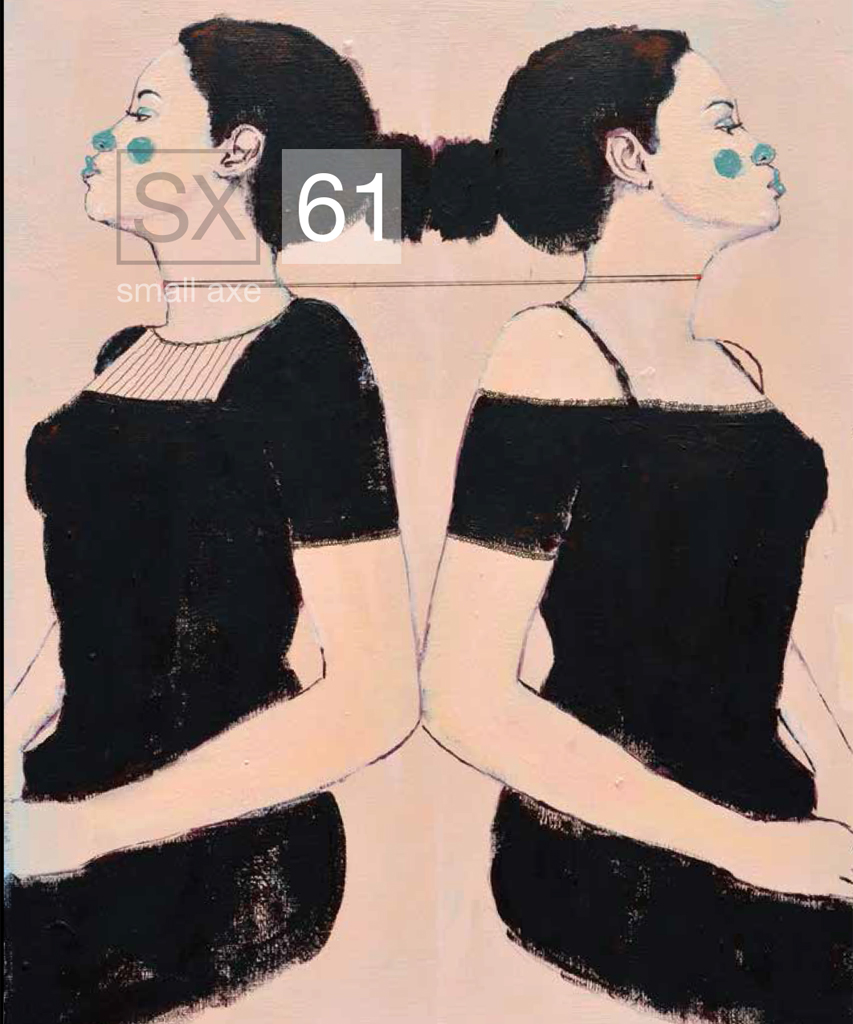
Features essays by Guillermina de Ferrari, Shawn C. Gonzalez, and Yomaira C. Figueroa. Special Section titled, “Con-Federating the Archipelago: The Confederación Antillana and the West Indian Federation” from Guest Editors Yolanda Martínez- San Miguel and Katerina Gonzalez Seligmann. Contributors include Kahlila Chaar-Pérez, Ángel A. Rivera, Raphael Dalleo, Katerina Gonzalez Seligmann, Alison Donell, Glyne Griffith, and Jossianna Arroyo. A book discussion about Vanessa Valdés’ Diasporic Blackness: The Life and Times of Arturo Alfonso Schomburg with essays by Nancy Raquel Mirabal, José I. Fusté, Evelyn Laurent-Perrault, and Vanessa Valdés. The artist featured on the sx61 cover is Sarah Knights, whose Visual Essay, "One Thousand Mes" is featured in this journal issue.
3/19: WENDY NANAN at the ORGANIZATION OF AMERICAN STATES AMA | ART MUSEUM OF THE AMERICAS
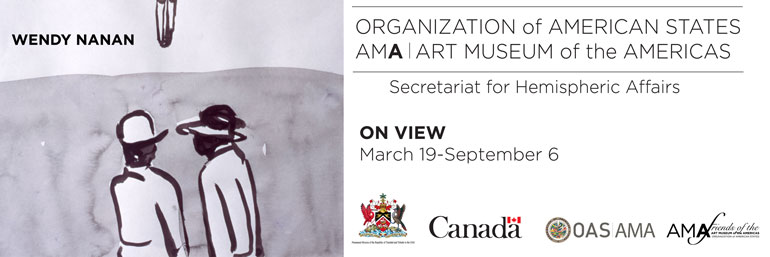
WENDY NANAN
March 19-September 6, 2020
OPENING RECEPTION
POSTPONED, new date TBD
HOURS
Tuesday-Sunday 10 AM-5 PM
LOCATION
OAS AMA | Art Museum of the Americas
201 18th Street NW
Washington, DC 20006
ADMISSION
Free
WASHINGTON, DC – The AMA | Art Museum of the Americas of the Organization of American States (OAS) and the Permanent Mission of Trinidad and Tobago to the OAS proudly present WENDY NANAN, a retrospective solo exhibition by the pioneering Trinidadian artist. Curated by Trinidadian-Canadian scholar Andil Gosine, WENDY NANAN will be the largest exhibition of the artist’s life’s work, and will include key projects from her repertoire over the last four decades:
Cricket: Since the early 1980s, Nanan has been drawing scenes of cricketers from games she has attended, some with her parents, who were dedicated fans of the sport. These drawings are remarkable for their intense observation and quick calligraphic rendering in the Japanese zenga manner, of cricket in play at the Queen’s Park Oval. Occupying the AMA’s largest gallery, this exhibition marks the first time that so many of the works are seen together.
Breath: Following her recent exhibition in Trinidad, Nanan has created a series of eight new pod-like sculptures for this exhibition. Constructed from papier-mâché and sea shells that the artist has collected over regular trips to Manzanilla beach along the Trinidad’s Atlantic coast, and sculpted in the form of a vulva, the series is centrally concerned with the anxieties about women’s bodies and sexualities. Accompanying the series will be the debut of a 22-minute video by the curator in which the artist recounts her biography while audiences witness their creation.
Additionally, four brightly-coloured papier-mâché sculptures complete the show:
Depicting a marriage between the Hindu god Vishnu and the Catholic Madonna in a space that is part-temple, part-church, in Idyllic Marriage, Nanan thrusts into an interrogation of the necessary discomfort of mixing in the Americas, slyly observant of both the productive rewards and violence of hybridity. The piece simultaneously invites critique and reflection about male-female relationships and the historical institutionalized marginalization of women.
A new Baby Krishna from her series that reimagines the Hindu deity Krishna, will also debut. The original series of four papier-mâché sculptures presented an answer to the question, “What happens when Asia comes to the Americas?” Nanan’s depictions not only add Christian-signifying angel wings and a halo, reflecting the reality of cultural mixing in the region, but also various items (including sugarcane, salt, and oil) that signify the industries that were socially formative across the region. The resulting work is neither blasphemous nor celebratory and is offered instead as a catalyst for contemplative interrogation of our times.
The Bounce from her oversized book series continues the artist’s exploration of shared struggles and spiritualities across the Americas. In this work, lyrics from the epic Billie Holiday song are the background text to the bounce between the Hindu god Ganesh and The Lion of The Twelve Tribes. It references the “bounce” shared between Barack and Michelle Obama on election night, a time when universal forces colluded to say we have finally overcome.
Finally, Persona charts the artist’s biography in nine phases.
BIOGRAPHIES
Wendy Nanan
Born in Trinidad and Tobago in 1955, Nanan is the first Indo-Trinidadian, and among the first Caribbean women artists to have a long and sustained professional practice. She obtained her BFA at Wolverhampton Polytechnic,England in 1979. Her work is included in many public and private collections, including Trinidad and Tobago’s National Museum. In her practice, Nanan takes on core questions at the heart of historical and contemporary struggles about identity, culture and power in the region. She has produced work that is at once historically and geographically specific to the place she inhabits, and timeless, gently provocative and persistently infused with her feminist politics. While Nanan is deeply respected by peers and critics in the Caribbean, she remains an under-attended-to artist, in part due to her determined locally-situated practice,she has remained in Trinidad since completing art school in 1980, and is famously reclusive, her philosophy being that “it is more important to create the work than to seek an audience for it.” Work by Nanan will also be included in "Cultural Encounters - Art of the Asian Diaspora" at Morikami Museum (Florida), and "Visible Man - Art and Black Male Subjectivity" at the Dorothy Uber Bryan Gallery (Ohio), in 2020.
Andil Gosine
Andil Gosine is Professor of Environmental Art & Justice at York University, Toronto. Dr. Gosine’s scholarship and artistic practice examine imbrications of ecology, desire and migration, and include numerous publications and multimedia projects. Exhibitions of his work Deities, Parts I & II showed in New York in 2019, and Coolie Coolie Viens and All the Flowers in Canada in 2018. Dr. Gosine is currently completing revisions on his forthcoming monograph, Nature's Wild: Love, Sex and Law in the Caribbean (Duke). He is also working on a book project about Wendy Nanan.
AMA | Art Museum of the Americas
The AMA serves as the principal instrument of cultural diplomacy of the OAS. AMA’s mission is founded on the notion that the arts are transformative for individuals and communities. This guiding principle promotes the core values of the OAS by providing a space for cultural expression, creativity, innovation, dialog, and learning, while highlighting themes such as democracy, development, human rights, justice, freedom of expression, and innovation. AMA’s work draws on contemporary art to showcase a constructive vision of the future of the Americas via local and hemispheric cultural exchange. Wendy Nanan is part of a larger effort that AMA is making to amplify the voices of Caribbean, women and non-binary artists and curators.
Accessibility: This exhbition takes place on AMA's first floor, and is wheelchair accessible; please inform the guard at the front entrance to open the back doorway at the top of the ramp. There is a flight of winding stairs leading to the museum’s second floor. Restrooms are located on the second floor. For more information on accessibility, please contact 202 370 0147 or artmus@oas.org
Nightboat Offsite Reading & Celebration AWP 2020: Friday, March 6th, 2020 from 5:30-7:30pm at La Quinta Inn & Suites in San Antonio, TX
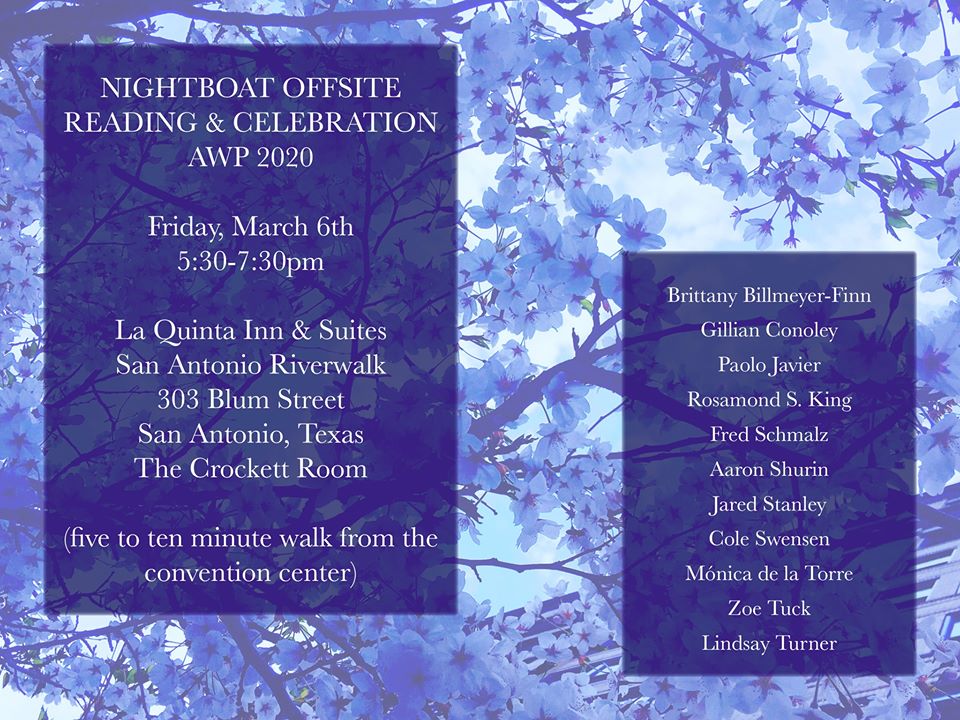
A book signing will be hosted at Nightboat books on Friday, March 6th Nightboat Reading from 5:30-7:30 pm at La Quinta Inn & Suites San Antonio Riverwalk (The Crockett Room, 303 Blum San Antonio, Texas 78205).
Rosamond S. King, associate professor of English at Brooklyn College, CUNY and author of Island Bodies: Transgressive Sexualities in the Caribbean Imagination (University Press of Florida, 2014) will be at booth #1045 signing books of poetry.
AWP San Antonio Office Hours & Friends Reading: Thursday, March 5th, 2020 at Grand Hyatt San Antonio (3:00-4:30pm)
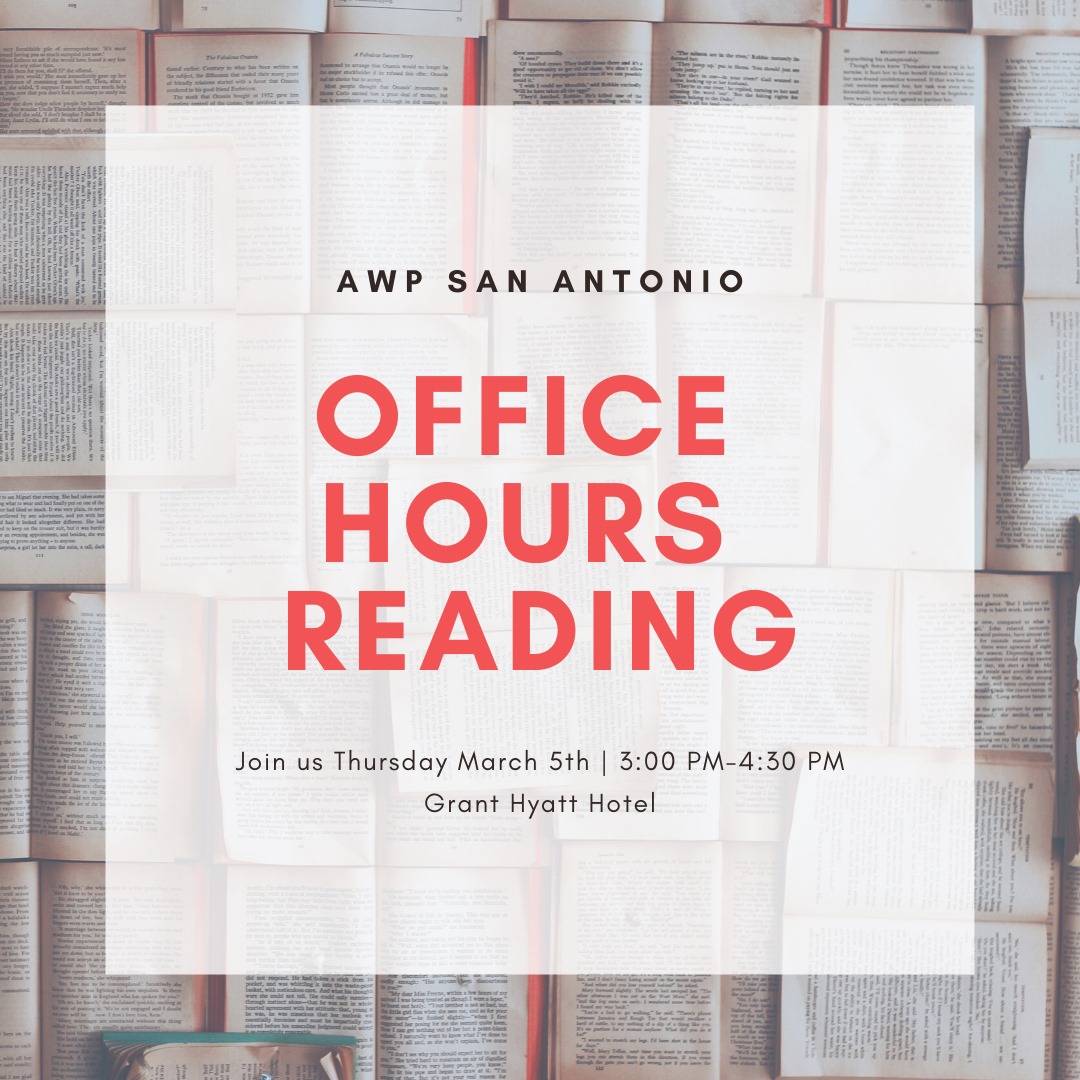
Join members of the Office Hours Poetry Community for an onsite reading at AWP San Antonio. Location: Grand Hyatt, (Seguin A), 4th Floor. The event goes from 3:00 to 4:30 pm.
Robin Gow is the author of Our Lady of Perpetual Degeneracy (Tolsun Books, 2020) and the chapbook Honeysuckle (Finishing Line Press, 2019. They are an adjunct instructor and grad student at Adelphi University. Gow is also the author of A Million Quiet Revolutions, a forthcoming Young Adult Verse Novel.
JP Howard is an educator, literary activist, curator and community builder. Her debut poetry collection, SAY/MIRROR (The Operating System), was a Lambda Literary Award finalist. She is also the author of bury your love poems here (Belladonna*) and co-editor of Sinister Wisdom Journal Black Lesbians--We Are the Revolution! JP has received fellowships from Cave Canem, VONA, and Lambda. Her poetry is widely anthologized. JP curates Women Writers in Bloom Poetry Salon, a NY based forum offering writers a monthly venue to collaborate. http://www.jp-howard.com
Miah Jeffra is author of The First Church of What's Happening (Nomadic 2017), The Fabulous Ekphrastic Fantastic! (Sibling Rivalry 2020), The Violence Almanac (Black Lawrence 2021), and co-editor, with Arisa White and Monique Mero, of the anthology Home is Where You Queer Your Heart (Foglifter 2020). Awards include the New Millennium Prize, the Sidney Lanier Fiction Prize, the Alice Judson Hayes Fellowship, Lambda Literary Fellowship, and 2019 finalist for the Lambda Literary Award for Outstanding Anthology. Miah is founding editor of queer literary collaborative, Foglifter Press.
Rosamond S. King’s publications include the forthcoming All the Rage, the Lambda Award-winning Rock | Salt | Stone and poems in more than three dozen journals, blogs, and anthologies, including The Feminist Wire, Harriet, and The Caribbean Writer. She is sx salon’s Creative Editor and Associate Professor at Brooklyn College. Her goal is to make people feel, wonder, and think, usually in that order. www.rosamondking.com
Sanjana Nair is a full-time professor at the City University of New York’s John Jay College of Criminal Justice. She has taught at New York University and Miami University and served as the first Treasurer for the Asian American Poetry organization Kundiman. Her poetry has appeared in Spoon River Poetry Review, Fence Magazine, JuxtaProse Literary Magazine, The Equalizer, Swimm, What Rough Beast for Indolent Books, Anastamos, No, Dear Magazine, Prometheus Dreaming, The Southampton Review and The Bangalore Review. Deeply invested in collaboration, her work has been performed in multiple Emotive Fruition shows New York City and her piece The Lady Apple, a collaboration between poet and composer Beata Moon, was performed at Tribeca’s Flea Theater as well as featured on National Public Radio’s Soundcheck. She resides with her family in Brooklyn.
Sarah M. Sala is a queer poet of Polish-Lebanese descent. Her debut collection, Devil’s Lake is forthcoming from Tolsun Books August 2020. She is the founding director of the free poetry workshop, Office Hours, and Assistant Poetry Editor at the Bellevue Literary Review. Her work appears in BOMB, the Southampton Review, and the Los Angeles Review. Visit her at sarahsala.com and @sarahmsala.
Benny Sisson is a trans poet. She is a library assistant, adjunct instructor, and MFA candidate at Adelphi University. Her work has been featured with Lunch Ticket, Crab Fat Magazine, Up the Staircase Quarterly, and elsewhere. She currently lives in Mineola, NY.
Noel Quiñones is a Puerto Rican writer, community organizer, and performer from the Bronx. His work has been published in POETRY, the Latin American Review, Rattle, Kweli Journal, and elsewhere. He is the founder and former director of Project X, a Bronx-based arts organization, and a current M.F.A. candidate at the University of Mississippi.
CHRISTINA QUINTANA (CQ) is a writer with Cuban and Louisiana roots, and the author of the full-length play Scissoring (Dramatists Play Service) and The Heart Wants, a chapbook of poetry (Finishing Line Press). Her plays have been developed and produced across the country, and she is the recipient of fellowships from MacDowell, Playwrights Realm, Van Lier New Voices at the Lark, Queer/Art and Lambda Literary. Most recently, her dystopian television drama, Invisible Lily, was featured on the 2020 WeForShe "Ones to Watch" List, and CQ served as staff writer on the upcoming ABC series The Baker and the Beauty. She is currently at work on a new musical commissioned by Black Cap Productions based on Lives in Limbo: Undocumented and Coming of Age in America by Roberto G. Gonzales and a literary novel with the working title The Twisted Fate of La Media Luna. For more, visit www.cquintana.com
Sarah Sala is a queer poet of Polish-Lebanese descent. Her debut collection, Devil’s Lake is forthcoming from Tolsun Books June 2020. She is the founder of the free poetry workshop, Office Hours, and Assistant Poetry Editor at the Bellevue Literary Review. Her work appears in BOMB, the Southampton Review, and the Los Angeles Review. Visit her at sarahsala.com and @sarahmsala.
